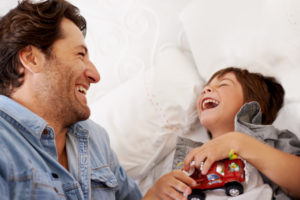 As parents and/or as mental health professionals, we might assume divorce always has a negative emotional impact on children. When children are exposed to chronic conflict between their parents, however, divorce may be a better choice for parents than staying together and continuing to expose children to the chronic conflict.
As parents and/or as mental health professionals, we might assume divorce always has a negative emotional impact on children. When children are exposed to chronic conflict between their parents, however, divorce may be a better choice for parents than staying together and continuing to expose children to the chronic conflict.
Living under one roof can be extremely stressful for parents who might otherwise consider divorce but are working hard to both keep the family together and meet financial obligations. The impact of this stress often contributes to chronic conflict among the parents, and when children are exposed to this conflict and stress, they experience stress themselves.
Often the chronic conflict that occurs while the family is under one roof becomes the norm for children, who can be compared to barometers, or little instruments that measure atmospheric pressure. Children “measure” the conflict and stress, and their behavior often reflects what they experience.
How Are Children Affected by Chronic Conflict?
Children who experience distress as a result of chronic conflict between parents may be impacted negatively in a number of ways. As they grow up, they may lack role models for healthy relationships. When parents put all of their energy into the conflict existing between them, both the relationship with the children and the ability to parent may be impacted. If conflict is particularly harsh or volatile, children may learn and model a lack of respect for others. Often, children may also find it difficult to trust others or develop faith in healthy, positive relationships, and these effects may impact their adult relationships.
Children do much better when their parents are happy and doing well, physically and mentally. Sometimes finding this state of well-being and happiness requires ending the marriage or partnership.
When parents project the negative energy created by chronic conflict, children are more inclined to feel pressure to take sides, and they often absorb the negative energy projected by vocal fighting and arguing. Thus they are then placed in the position of having to deal with adult problems they shouldn’t be exposed to.
Separation of the parents can often relieve the stress at the root of the chronic conflict. When parents separate or divorce, there are certainly transitions and adjustments to be made by the children, and indeed the whole family, but the stresses of daily living under one roof are often relieved, and relationships among family members are likely to improve.
What Factors Determine How Well Children Adjust?
Parents who model positive relationship behaviors, including ending partnerships that are unhealthy, toxic, or simply not working out, can show their children everyone deserves to be in happy and healthy relationships. By not settling for less themselves, they can help their children learn to make similar choices.
Children do much better when their parents are happy and doing well, physically and mentally. Sometimes finding this state of well-being and happiness requires ending the marriage or partnership. If there is no way to reduce the level of conflict between parents, the children are unlikely to derive any benefit from their parents staying together when levels of relationship conflict are high and unlikely to lower.
Through my work with individuals in my practice, I have found three key factors typically determine how well children will adjust to divorce:
- The quality of the relationship the children have with each parent prior to the divorce
- The length of time the chronic conflict has occurred as well as the intensity of the conflict
- The ability of the parents to make the needs of the children a priority during the divorce
Per my professional experience, it is the conflict and the quality of communication between the divorced parents, not the divorce itself or who the children live with, that is the largest factor determining how well children will adjust to the divorce. The mother’s attitude toward the father has a significant impact on the amount of time and the quality of time fathers have with their children after divorce. This is not to say it is the mother’s responsibility to ensure that fathers step up for their children. However, when one parent openly display a negative attitude toward the other parent, the likelihood of that parent withdrawing more from the children’s lives is increased. If this happens, the children will likely experience a negative emotional impact.
It is just as important for both parents (of any gender) to remain openly respectful and collaborate regarding the needs of the children. It is important for the parent without primary custody to make seeing their children consistently a priority, in order for a quality relationship to endure. Further, the parent paying child support should make certain to pay it in a timely manner and continue to take responsibility for continued involvement with their children’s schooling and activities (sports, lessons, performances, and so on).
Adolescents who have difficulty adjusting to divorce have typically experienced a lengthy period of high conflict both before and during the divorce. Adolescents who are able to adjust well typically come from a situation where parents collaborated and negotiated based on what was in the best interest of the children.
Positive Outcomes for Children
Per my observations from working with families affected by divorce or separation, the following are some positive results that can be the outcome for some children after divorce:
- Children often become more resilient and adaptable because they must develop coping strategies for adapting to different situations and to change.
- Due to the change in income often experienced, children often have to become more self-sufficient, as both parents are most likely working. Even when one parent was able to stay at home before the divorce, that parent will most likely need to work after the divorce, and children, accordingly, must often take more responsibility for household chores.
- Children who experience divorce are more likely to have increased empathy for others. When children who experience divorce observe others they care about having difficulty, it often resonates more, and they become more accepting of the various problems and situations experienced by others.
- Children are often able to have more quality time with each parent. Children from more traditional families often report being able to spend more time with their fathers after the divorce and experience benefit from that.
- Children develop a recognition for the significance of the commitment marriage requires. Children from divorce sometimes develop a deeper understanding of the stakes involved when deciding to marry. Some children, especially as they reach young adulthood, often decide they do not want to repeat the dynamic they saw in their parents’ relationships in their own relationships. They will often make special efforts to ensure their relationships are more stable and healthy as a result of experiencing chronic conflict between their parents and the resulting stress they experienced while growing up.
The bottom line is this: the happiness of our children, now or in the future, does not rest solely on the institution of marriage or divorce in and of themselves. Their happiness is based on routine, confidence in their relationships with their parents, and their perceptions of their parents as people of strong character. The fear of parental abandonment puts children at the greatest risk when there is chronic conflict and/or when divorce happens. Therefore, parents need to ensure, whether they stay married or decide to divorce, their relationships with their children are a top priority, primarily by including self-care and modeling healthy relationships. A qualified and compassionate professional can often be of assistance here!
References:
- Mohi, G. W. (2015, September 22). Positive outcomes of divorce: A multi-method study on the effects of parental divorce on children. University of Central Florida Undergraduate Research Journal, 7(2). Retrieved from from https://www.urj.ucf.edu/docs/mohi.pdf.
- Positive effects of divorce on children. (n.d.). Retrieved from http://divorce.laws.com/positive-effects-of-divorce-on-children
- What are the effects of divorce on children? (n.d.). FamilyMeans. Retrieved from https://www.familymeans.org/effects-of-divorce-on-children.html

The preceding article was solely written by the author named above. Any views and opinions expressed are not necessarily shared by GoodTherapy.org. Questions or concerns about the preceding article can be directed to the author or posted as a comment below.

 7 Tips for Communicating with Your Children About Your Divorce
7 Tips for Communicating with Your Children About Your Divorce Parenting Ideas to Enhance Parent-Child Relations in Divorce
Parenting Ideas to Enhance Parent-Child Relations in Divorce 4 Ways to Ensure a Terrible Divorce Experience for Your Kids
4 Ways to Ensure a Terrible Divorce Experience for Your Kids

Please fill out all required fields to submit your message.
Invalid Email Address.
Please confirm that you are human.
Leave a Comment
By commenting you acknowledge acceptance of GoodTherapy.org's Terms and Conditions of Use.